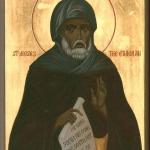
In the Byzantine tradition, the first of September begins the new ecclesiastical year, echoing the belief that Christ begun his mission to the world (by entering the synagogue and preaching) on September 1. It is also the day which tradition suggested the world was created. The Byzantine use of September 1 for their new ecclesiastical year is symbolic, pointing to the beginning of creation, but also the beginning of Christ’s public ministry, tying them together to the Byzantine spiritual life. And so, the new year is begun with a prayer to God, asking for God to bless the year ahead:
Lord of the universe who by Thy power hast established the times and seasons, bless this year with Thy goodness, preserve our rulers and keep Thy flock in peace, through the prayers of the Mother of God, and save us (Troparion of the New Year).
Every day is a new day; every day is a time of a new beginning; every day is a day for us to reach up to God and to ask for God’s blessings. Every day is a day to ask God to help revitalize our spirit. We can and should look to symbols to help us engage God, to encounter the greater mystery of God, and through that encounter, be open to a better, greater relationship with God. We should do this not just once a year, but on a daily basis. Every day grants us the potential for a new beginning, as well as every day shows us, with its particular ending, that we are all heading towards our own personal end, the time of which we know not.
Life and death are interconnected; we would not come to death, the end of our temporal existence, if we first did not have life. The beginning and the end are tied together in Christ, as he is the Alpha and the Omega, the beginning and the end. God made all things in and through him, and now all things are made anew in him. Once everything has been brought back to where it was before sin tainted it, we can find ourselves being united with God. The one who created all things, gave the world its light, then gave to it a new light, the light of grace to overcome the darkness of sin. We are meant to take in that light and let shine in us, to join ourselves to it, so we can become lights ourselves:
For it is the God who said, “Let light shine out of darkness,” who has shone in our hearts to give the light of the knowledge of the glory of God in the face of Christ. But we have this treasure in earthen vessels, to show that the transcendent power belongs to God and not to us (2 Cor. 4:6-7 RSV).
We are “earthen vessels,” that is created beings; while the light of grace shines in us, it also transcends us, and it is because it transcends us, it is able to make us greater than we presently are. However, if we try to take it and claim it as our own, we will find ourselves becoming stuck as we are, unable to take in more than we have and so cut off from the deification it is meant to give us. We must always remember its source lies with God. We must remain open to God. To do this, therefore, we must embrace the way of love, for it is love which makes sure we do not become so self-referential, so self-attached, but rather, geared towards God, the source and foundation of all that is good, and others, whom God has made:
But when the Pharisees heard that he had silenced the Sadducees, they came together. And one of them, a lawyer, asked him a question, to test him. “Teacher, which is the great commandment in the law?” And he said to him, “You shall love the Lord your God with all your heart, and with all your soul, and with all your mind. This is the great and first commandment. And a second is like it, You shall love your neighbor as yourself. On these two commandments depend all the law and the prophets” (Matt 22:24-40 RSV).
If we love, we will act out of love, bearing the burdens of life for the sake of others, even as Jesus bore the burden of sin for us. We will bear with the afflictions we receive for the sake of our beloved – indeed, we would willingly sacrifice ourselves for them, if their lives were in jeopardy and we could but save them. This is what Jesus did when he willingly took up the cross; he did so out love for us, knowing it was the way he would take on the structures of sin and defeat them. The Alpha and the Omega, the beginning and the end, the eschaton made immanent, took on sin so that it could and would come to its proper end, revealing, in that end, its inner nature, its nothingness, its insubstantiality. As Christians, as those who become a part of the body of Christ, we should therefore find a way to join ourselves to Christ and Christ’s work, to manifest Jesus to the world, and by doing so, help to others, as Paul indicated he did for the sake of the Corinthians (and other Christians):
We are afflicted in every way, but not crushed; perplexed, but not driven to despair; persecuted, but not forsaken; struck down, but not destroyed; always carrying in the body the death of Jesus, so that the life of Jesus may also be manifested in our bodies. For while we live we are always being given up to death for Jesus’ sake, so that the life of Jesus may be manifested in our mortal flesh. So death is at work in us, but life in you (2 Cor. 4:8-12 RSV).
We must not seek out pain and suffering, for pain and suffering ar not good, but rather, we should strive and wrestle with Christ, working together with him to bring pain and suffering to an end, even if it means, for a time, we might have to take it on ourselves in order to free others from its power. Again, the point is to bring it to its end, so that others can have and experience a life apart from it, even as Jesus took upon powers of sin and death so that everyone can come to a new creation, a new life, that is, eternity apart from it. And, with a new ecclesiastic year just beginning, for those of the Byzantine tradition at least, we can and should reflect upon the way the new year points to the new life we have been given in Christ, even as the old year represents the way Christ has had a decisive victory over sin and death, showing that they will come to an end.
Stay in touch! Like A Little Bit of Nothing on Facebook.
If you liked what you read, please consider sharing it with your friends and family!
N.B.: While I read comments to moderate them, I rarely respond to them. If I don’t respond to your comment directly, don’t assume I am unthankful for it. I appreciate it. But I want readers to feel free to ask questions, and hopefully, dialogue with each other. I have shared what I wanted to say, though some responses will get a brief reply by me, or, if I find it interesting and something I can engage fully, as the foundation for another post. I have had many posts inspired or improved upon thanks to my readers.











